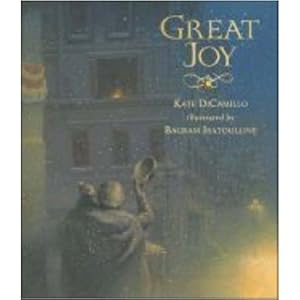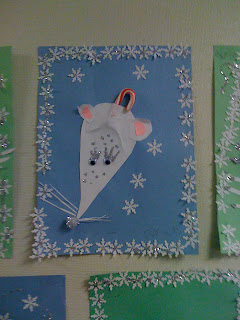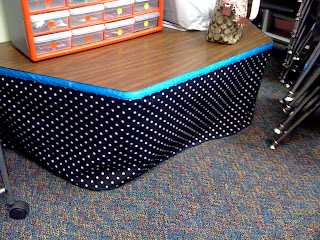If you are looking for another touching Christmas story to share with your kids, look no further than The Little Fir Tree, by Margaret Wise Brown.
This story brought tears to my eyes as I was reading it to my class! A little fir tree is all alone in a meadow. One winter day, a man comes and digs him up, roots and all, and re-plants him in a box to be the Christmas tree for a little boy who cannot get out of his bed. Each year, after Christmas, the man returns the fir tree to the forest. I won't spoil the ending for you, but this book is a keeper!
When we were done reading, we made pine cone tree ornaments as gifts for the parents this year. (I like to make several gifts, and let children choose which to give to their parents. It helps those with blended families and the like.) I am not the creator of this project. I discovered it through Pinterest. The original can be found here.
Pine Cone Christmas Trees:
The easy steps:
(1) I mixed some tempera to be a lighter green by adding white.
(2) Students have fun painting the entire pine cone green.
(3) When paint is mostly dry (but maybe not all the way) have students use bottle glue to decorate the edges of each section of pine cone (Not sure what those sections are called!).
(4) Students choose a glitter color, and glitter away!
(5) Students painted a wooden star with yellow tempera
The next two steps are best done by the teacher, using a hot glue gun:
(6) Glue on some gold ribbon
The next two steps are best done by the teacher, using a hot glue gun:
(6) Glue on some gold ribbon
Glue the star on top of the ribbon.
These turned out so cute, I had my own two kiddos come back to school with me at night so we could make a couple for our own tree! It's great when you can get double-duty out of a project!
We also learned how to do +/- 10 math problems on Friday! If you haven't been to Teacher Tipster yet, you should. He has an awesome idea about brain chains. I added these into my classroom this year, and I really do think they made a difference! I'll include the video here, to make it easy to find:
I bought a bunch of shoe laces, parents donated the beads, and we have been using the brain chain as part of our calendar routine all year. I added in brain chains for the students on Friday. We practiced building numbers, and then I took his brain chain worksheet (which is no longer on his site, I guess?) and added it into my own to create the one below:
10 With Brain Chains
He is right. The brain chains are a very effective tool! My students were able to demonstrate their knowledge of Place Value easily, and it provided a valuable "bridge" between recognizing place values and manipulating those place values. Having something visible and tactile was a great help to some of my little strugglers, and I felt like most of the children understood the concept of adding or taking away 10s with very little one-on-one support. Hooray for "Brain Chains"!
These turned out so cute, I had my own two kiddos come back to school with me at night so we could make a couple for our own tree! It's great when you can get double-duty out of a project!
We also learned how to do +/- 10 math problems on Friday! If you haven't been to Teacher Tipster yet, you should. He has an awesome idea about brain chains. I added these into my classroom this year, and I really do think they made a difference! I'll include the video here, to make it easy to find:
I bought a bunch of shoe laces, parents donated the beads, and we have been using the brain chain as part of our calendar routine all year. I added in brain chains for the students on Friday. We practiced building numbers, and then I took his brain chain worksheet (which is no longer on his site, I guess?) and added it into my own to create the one below:
10 With Brain Chains
He is right. The brain chains are a very effective tool! My students were able to demonstrate their knowledge of Place Value easily, and it provided a valuable "bridge" between recognizing place values and manipulating those place values. Having something visible and tactile was a great help to some of my little strugglers, and I felt like most of the children understood the concept of adding or taking away 10s with very little one-on-one support. Hooray for "Brain Chains"!

























































